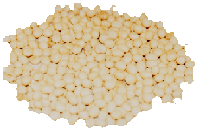 © Copyright Laurence Saettel |
Soybeans are a high protein legume native from Southeast Asia. |
Soybeans are the richest plant food in protein.
100 g of cooked soybeans provide the same amount of protein than 100 g of meat.
Moreover, contrary to the other beans, soybean contains all essential amino-acids and the digestibility of its protein is 98 %.
|
Essential amino acids
|
Essential amino acids
(in mg / g of proteins) |
Reference protein
FAO / O.M.S |
Histidine |
28
|
19
|
| Isoleucine |
50
|
28
|
| Leucine |
85
|
77
|
| Lysine |
70
|
58
|
| Methionine + cysteine |
28
|
19
|
| Phenylalanine + tyrosine |
88
|
63
|
| Threonine |
42
|
34
|
| Tryptophan |
14
|
11
|
| Valine |
53
|
35
|
Soybeans contain a compound named isoflavone which has been shown to help maintain bone density and therefore could reduce osteoporosis risk. These isoflavones would also have a role in preventing prostate cancer among men and breast cancer among women.
Due to their high content of polyunsaturated fatty acids, soybeans have the ability to lower blood levels of LDL cholesterol reducing the risk of coronary heart disease.
Soybeans provide also essential fatty acids and large amounts of minerals, vitamins and fiber.
Composition for 100 g
|
Nutrients
|
Units
|
Soybeans dryed
|
soybeans cooked
|
|
Water
|
g
|
8.54
|
62.55
|
| Energy |
kcal
|
416
|
173
|
| Protein |
g
|
36.49
|
16.64
|
| Total lipid (fat) |
g
|
19.94
|
8.97
|
| Carbohydrate |
g
|
30.16
|
9.92
|
| Fiber, total dietary |
g
|
9.31
|
6
|
|
Minerals
|
|||
| Calcium |
mg
|
277
|
102
|
| Iron |
mg
|
15.10
|
5.14
|
| Magnesium |
mg
|
280
|
86
|
| Phosphorus |
mg
|
704
|
245
|
| Potassium |
mg
|
1797
|
515
|
| Sodium |
mg
|
2
|
1
|
| Zinc |
mg
|
4.89
|
1.15
|
| Copper |
mg
|
1.658
|
0.407
|
| Manganese |
mg
|
2.517
|
0.824
|
| Selenium |
mcg
|
17.8
|
7.3
|
|
Vitamins
|
|||
| Vitamin C |
mg
|
6
|
1.7
|
| B-1 (thiamin) |
mg
|
0.874
|
0.155
|
| B-2 (riboflavin) |
mg
|
0.870
|
0.285
|
| B-3 (niacin) |
mg
|
1.623
|
0.399
|
| B-5 (pantothenic acid) |
mg
|
0.793
|
0.179
|
| B-6 (pyridoxine) |
mg
|
0.377
|
0.234
|
| Folate |
mcg
|
375
|
54
|
| B-12 |
mcg
|
0
|
0
|
| Vitamin A |
I.U
|
24
|
9
|
| Vitamin A |
mcg RE
|
2
|
1
|
| Vitamin E |
mcg ATE
|
1.950
|
1.950
|
|
Lipids
|
|||
| Fatty acids, saturated |
g
|
2.884
|
1.297
|
| Fatty acids, monounsaturated |
g
|
4.404
|
1.981
|
| Fatty acids, polyunsaturated |
g
|
11.255
|
5.064
|
| Linoleic acid (18:2) |
g
|
9.925
|
4.465
|
| Alpha-linolenic acid (18:3) |
g
|
1.33
|
0.598
|
| Cholesterol |
mg
|
0
|
0
|
Many products are made from soybeans which makes it easy to eat a small amount of soy every day.
Caution
When we talk about soy sprouts, we refer to mungo beans and not soy beans.
Mungo beans are also part of the legumes family but are green instead of yellow and do not provide the same nutritional values.
